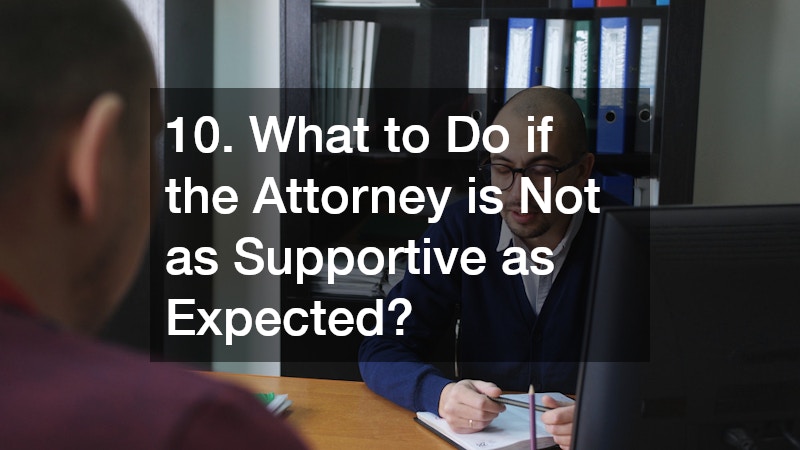Finding a supportive attorney is a crucial step in navigating the complexities of legal matters. Faced with the stress and uncertainty of legal proceedings, it is imperative to have an attorney who not only provides legal expertise but also offers emotional reassurance. This article focuses on helping you identify a supportive attorney to guide you through the legal challenges you face, ensuring that you feel understood and valued throughout the process.
1. What Makes an Attorney Supportive?

A supportive attorney possesses qualities that go beyond mere legal knowledge. They exhibit empathy, patience, and a genuine interest in your well-being. When dealing with appellate attorneys, it’s important that they understand your concerns and grievances and are committed to listening and addressing your needs comprehensively.
Moreover, a supportive attorney is transparent in their communications. They provide clear and concise explanations, keeping you informed about your case proceedings. This openness is especially important for appellate attorneys, who must navigate the complexities of appeals with precision and clarity.
Ultimately, the hallmark of a supportive attorney is their dedication to advocating for you both legally and personally. They go the extra mile to ensure your peace of mind, setting them apart from lawyers who focus solely on legal procedures.
2. How to Identify a Supportive Attorney During Consultations?
Initial consultations are key opportunities to assess whether an attorney will be supportive. Pay attention to how a criminal defense lawyer interacts with you during your first meeting. Do they show genuine interest in understanding your situation and making you feel comfortable? The initial conversation often sets the tone for the entire attorney-client relationship, making it crucial to evaluate both their demeanor and professionalism.
Observe their listening skills. A supportive criminal defense lawyer will allow you to express your concerns without interruption, and will thoughtfully engage with your questions and comments. They should be patient, approachable, and willing to explain legal processes in terms that are easy to understand. This attentiveness signals that they value your input and are committed to working collaboratively.
Additionally, gauge their ability to make you feel understood and respected. A supportive attorney demonstrates these qualities by addressing your specific needs and tailoring their approach accordingly, ensuring you receive personalized legal support and confidence moving forward.
3. What Questions Should I Ask to Gauge Supportiveness?
It’s essential to ask the right questions to determine the level of support an attorney is willing to provide. When consulting a franchise attorney, inquiring about their experience with similar cases can shed light on their capability to address your legal issues effectively.
Ask about their approach to client communication. A supportive franchise attorney will emphasize open lines of communication, be willing to answer questions, and provide updates as your case progresses. This commitment to transparency is a strong indicator of their supportiveness.
Finally, inquire about their availability for client meetings and discussions. A supportive attorney is accessible and prioritizes your needs, ensuring they are there to support you whenever necessary.
4. How to Research an Attorney’s Reputation for Support?

Researching an attorney’s reputation is vital in identifying their supportiveness. Begin by examining reviews and testimonials online, focusing on feedback from clients who have worked with trust attorneys. Pay close attention to comments that go beyond legal skill and mention qualities such as responsiveness, compassion, or patience. Positive reviews that highlight an attorney’s empathetic and supportive nature can provide reassurance that they are committed to client well-being in addition to delivering strong legal results.
Additionally, consider seeking recommendations from professional networks or acquaintances who have experienced similar legal issues. Firsthand accounts often provide a clearer, more candid picture of what it is like to work with a particular attorney. Someone who has successfully navigated the process of setting up or contesting a trust can share how the attorney communicated, how accessible they were, and how they balanced professionalism with empathy. These insights are invaluable in determining whether the attorney will be a good fit for your specific needs.
Finally, look into the attorney’s involvement in community or professional organizations. A supportive attorney often engages in activities that reflect their dedication to both the legal community and the well-being of their clients. Such engagement demonstrates a commitment to service that often translates into stronger, more client-focused representation.
5. Can Specialization Indicate a Supportive Attorney?
Specialization in a specific legal field can be an indicator of a supportive attorney. For instance, a family lawyer who focuses solely on family law is likely to have a deeper understanding of the emotional complexities involved in such cases. Divorce, custody disputes, or adoption proceedings often touch on highly personal aspects of clients’ lives, and an attorney who has dedicated their practice to this area is more equipped to anticipate both the legal challenges and the emotional hurdles clients face.
This specialization allows them to offer more compassionate and empathetic support, understanding the intricacies of family dynamics and how they affect legal proceedings. They recognize that their role is not just about presenting arguments in court, but also about providing reassurance and helping clients feel heard and understood during stressful times. By drawing on years of experience handling similar cases, they can suggest solutions that balance legal requirements with emotional realities, such as mediation strategies that protect relationships where possible.
Therefore, when seeking a supportive attorney, consider their specialization and how it aligns with your specific needs. The right match can make a significant difference in the level of guidance, comfort, and advocacy you receive throughout your legal journey.
6. What Role Does Compatibility Play in Finding a Supportive Attorney?
Compatibility is a crucial factor when selecting a supportive attorney. An immigration lawyer, for example, must align with your communication style and understand your unique cultural background. Immigration matters often involve deeply personal issues such as family reunification, employment opportunities, or the pursuit of permanent residency, and these concerns can be emotionally overwhelming. When your attorney demonstrates cultural sensitivity and adapts to your preferred way of communicating, it becomes easier to share your story openly and honestly.
A supportive immigration lawyer takes the time to establish rapport, ensuring that you feel comfortable discussing sensitive issues related to your case. They respect your perspective and make an effort to understand not only the legal details but also the personal circumstances influencing your goals. This might include acknowledging language barriers, recognizing cultural values, or being mindful of traditions that shape your decision-making process. By creating this level of trust, they reduce the stress and uncertainty often associated with navigating complex immigration systems.
This compatibility fosters an environment where you can communicate freely and openly, significantly enhancing the support you receive throughout the legal process. With strong rapport and mutual understanding, your attorney becomes not just a legal advisor but also a trusted advocate committed to your success.
7. How Important is Availability in a Supportive Attorney?

Availability is a key component of a supportive attorney-client relationship. A supportive attorney, like life insurance lawyers, ensures they are accessible and responsive to their clients’ needs. Life insurance claims often arise during difficult times, such as after the loss of a loved one, making timely communication especially important. In such sensitive situations, delays or a lack of responsiveness can heighten stress, leaving clients feeling overlooked or uncertain about the progress of their case.
An attorney who is readily available to address your questions and concerns can alleviate anxiety and reassure you that you are prioritized. Whether through phone calls, emails, or scheduled meetings, life insurance lawyers who maintain consistent communication build trust and confidence. They clarify complex policy language, keep you updated on claim status, and promptly respond when unexpected challenges arise. This proactive accessibility demonstrates respect for your time and your emotional needs during an already challenging period.
Ultimately, a supportive attorney will balance their workload to ensure that their clients receive the attention and support needed to navigate their legal challenges effectively. By being both approachable and responsive, attorneys foster stronger relationships and ensure clients feel guided every step of the way.
8. What Ethical Considerations Should Be Assessed?
Ethical considerations play a significant role in determining an attorney’s supportiveness. When working with a custody attorney, it’s essential that they uphold ethical standards that foster trust and integrity. Because custody cases often involve emotionally charged disputes, sensitive family dynamics, and the well-being of children, clients must feel confident that their attorney is not only skilled but also principled in their approach.
A supportive custody attorney prioritizes your children’s best interests, maintaining transparent practices and avoiding conflicts of interest. They ensure that all advice and strategies align with legal standards while keeping the focus on creating a safe and stable environment for the child. This means discouraging tactics that could unnecessarily escalate tension, and instead promoting solutions that protect family relationships where possible. They also adhere strictly to confidentiality, safeguarding private details to preserve your family’s dignity and trust throughout the legal process.
Ethical conduct is fundamental in cultivating a strong, supportive relationship, ensuring that your attorney is genuinely committed to advocating for your and your family’s needs. By combining compassion with unwavering integrity, an ethical custody attorney provides reassurance during a difficult time and ensures your case is handled with fairness, respect, and professionalism.
9. How to Gauge Attorney Support in Different Legal Fields?
The level of support provided by an attorney can vary across different legal fields. An estate law attorney, for example, must balance technical legal knowledge with the ability to handle sensitive family issues compassionately. Because estate planning often involves discussions about end-of-life decisions, financial legacies, and care for loved ones, it requires not only legal expertise but also patience and empathy. A supportive attorney in this area takes the time to listen carefully, explain complex terms in everyday language, and guide you through emotionally charged decisions with sensitivity.
A supportive estate law attorney is attentive to your concerns about inheritance, guardianship, and other matters, providing advice that reflects both legal and personal considerations. They recognize that no two families are alike and tailor their guidance to align with your values and priorities. By drafting wills, trusts, and guardianship provisions that reflect your wishes, they help reduce the likelihood of family disputes and ensure your estate is managed as intended.
Exploring different legal fields can reveal the unique ways in which attorneys demonstrate support, helping you select the best fit for your particular legal issue. Whether it’s the compassion of an estate attorney, the advocacy of a family law attorney, or the strategy of a business lawyer, understanding these differences helps you find counsel who can meet your legal and personal needs.
10. What to Do if the Attorney is Not as Supportive as Expected?

If you find that your attorney is not as supportive as anticipated, it’s important to address these concerns promptly. Communicate openly with the attorney, voicing any dissatisfaction or issues with their approach. Sometimes, misunderstandings can arise simply from a lack of clarity, and a candid discussion may resolve the problem. For example, your attorney may not realize that you prefer more frequent updates or need legal terminology explained in simpler terms. By expressing your concerns directly, you give them the opportunity to adjust their communication style or strategy to better meet your expectations.
If the problem persists, consider seeking alternative legal counsel. A bankruptcy law firm can provide options for transitioning to a more supportive attorney who better aligns with your needs. Many firms understand that client–attorney relationships must be built on trust, empathy, and collaboration, and they will assist in making the switch as seamless as possible.
Ultimately, you deserve an attorney who respects and supports you throughout your legal journey. Bankruptcy can be stressful and emotionally draining, so having a professional who listens and advocates effectively is essential. Taking proactive steps ensures you receive the guidance and reassurance needed during this critical time.
The importance of finding a supportive attorney cannot be overstated. A supportive attorney brings not only legal expertise but also the emotional assurance you need during challenging times. By carefully evaluating potential attorneys based on their qualities and performance in key areas, you can secure a professional who is committed to providing both the legal and emotional support necessary for navigating complex legal issues effectively.


